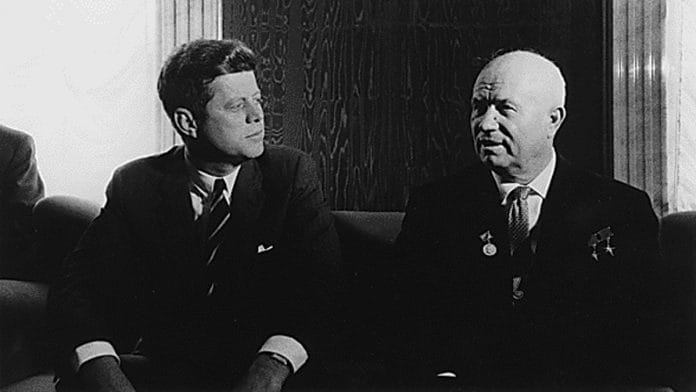New Delhi: The John F. Kennedy administration “buried” a mutual missile withdrawal deal with the Soviet Union as part of a “quid pro quo” to end the Cuban Missile Crisis, suggest documents released by the National Security Archive, a non-profit research institute at the George Washington University in Washington, D.C.
The “quid-pro-quo” here refers to the longstanding theory that the United States removed its missiles from Turkey — a North Atlantic Treaty Organisation (NATO) ally — around the time the Soviet Union removed its projectiles from Cuba.
In the 1962 crisis, the US under President Kennedy and the Soviet Union under Nikita Khrushchev, hovered on the brink of deploying nuclear weapons. Matters had reached a head in the October of that year after Washington ordered a naval quarantine of Cuba upon learning of the construction of Soviet missile sites on the island as part of an agreement between Moscow and Cuban premier Fidel Castro to prevent an American invasion.
The official reason for the crisis being averted was that the Soviet Union withdrew the missiles in exchange for the US declaring that it would not invade Cuba.
However, a lot more seems to have been going on behind the scenes. Letters, memorandums, and recordings from the White House and Justice Department, along with official Soviet communiques from the Kremlin and Soviet Embassy translated into English, and correspondence between journalists, released last week by the National Security Archive, add weight to the theory that a backchannel deal was central to resolving the standoff that marked the height of the Cold War.
However, the Kennedy administration was steadfast in its refusal to publicly acknowledge this arrangement. “President John F. Kennedy rejected Soviet Premier Nikita Khrushchev’s proposal to formalise a secret missile trade on paper,” the National Security Archive explained.
“The true story behind the resolution of the missile crisis was for years kept secret in one of the most consequential cover-ups in the history of US foreign policy,” said Peter Kornbluh, director of the National Security Archives’ Cuba Documentation Project. He added that though 60 years have passed since the Cuban Missile Crisis, it is a “history the international community needs to know because it remains immediately relevant to the events of today”.
Among the documents released was a letter dated 28 October 1962 from Chairman Khrushchev to President Kennedy, which suggests that the US agreed to remove missile bases from Turkey in return for the Soviet Union halting work on missile sites in Cuba and recalling missiles already on the island.
The letter also reaffirms that JFK’s brother and then US attorney general, Robert Kennedy, played a key role behind the scenes in resolving the crisis. According to the letter, it was he who conveyed to Anatoliy Fedorovich Dobrynin, the then Soviet ambassador to the US, that the removal of missile bases from Turkey would take four to five months.
“In this conversation, Robert Kennedy said that it is somewhat difficult for you (JFK) at the present time to publicly discuss the question of eliminating the US missile bases in Turkey because of the fact that the stationing of those bases in Turkey was formalised through a NATO Council decision,” Khrushchev wrote in the letter to his American counterpart.
October 28 1962, notably, was the day that Khrushchev issued a public statement that the nuclear ballistic missiles that his forces had installed in Cuba would be removed.
Also Read: ‘Highest since Cuban missile crisis’: Biden sounds ‘Armageddon’ alarm on Putin nuclear threat
Kennedy’s political attack on UN ambassador
Documents released by the National Security Archive illustrate how President Kennedy doubled down on his efforts to delegitimise the theory that a “quid pro quo” had been struck between the US and the Soviet Union. To that effect, Kennedy orchestrated a political attack on then US ambassador to the United Nations, Adlai Stevenson, via an article published in the Saturday Morning Post in early December 1962.
Stevenson had publicly advocated for a deal between Moscow and Washington to calm tensions, essentially advising the US to remove its missiles from Turkey and the Soviets to do the same in Cuba.
In the article titled ‘In time of crisis’, authors Stewart Alsop and Charles Bartlett, quoted a “nonadmiring (US) official” as saying: “Adlai wanted a Munich. He wanted to trade the Turkish, Italian and British missile bases for the Cuban bases.”
The purpose of the quote was to reify that the Cuban Missile Crisis was resolved without a deal involving reducing American missile bases.
Documents released last week include a letter from March 1964 by Clay Blair Jr — editor of Saturday Morning Post— and Stewart Alsop, one of the article’s two authors, hinting that the “nonadmiring official” quoted in the article was indeed President John F. Kennedy.
In the letter, Blair Jr asked Alsop whether he could confirm on the record that “JFK approved the piece”. In his response to Blair Jr, Alsop wrote: “If I so much as hinted that JFK was in any way involved, I’d be run out of town.”
“The article helped Kennedy cover up the fact that he had implemented Stevenson’s private advice during the missile crisis and secretly traded the removal of U.S. missiles in Turkey for the withdrawal of the Soviet missiles in Cuba,” said the National Security Archive.
(Edited by Amrtansh Arora)
Also Read: One of the few issues Nixon & Kennedy agreed on was US helping India win race against China






